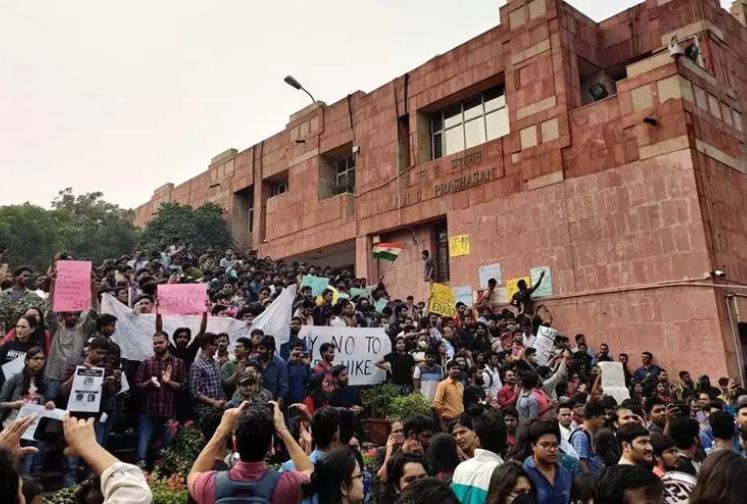NEW DELHI, 19 July 2024 – Jawaharlal Nehru University (JNU) has issued a circular enforcing a strict JNU protest ban within 100 meters of the administrative block, reiterating its zero tolerance for violence. The university also announced plans for weekend classes to compensate for academic delays caused by the late results of the CUET UG exams. These measures are in compliance with High Court directions aimed at maintaining campus discipline.
JUN Protest Ban Enforced
Jawaharlal Nehru University has banned protests and mass gatherings within 100 meters of the administrative block to maintain campus discipline and order. The administration emphasized its zero tolerance for violence and any form of indiscipline on campus. The JNU protest ban aims to create a safer and more conducive academic environment.
Fines for Violations
Violations of the protest ban will result in fines: Rs 20,000 for protests within the restricted area and Rs 10,000 for printing or circulating derogatory posters. These measures align with High Court directives and aim to ensure a safe and orderly campus environment. The JNU protest ban is enforced to deter activities that disrupt academic peace.
Weekend Classes Scheduled
To address academic delays caused by the late release of CUET UG results, JNU plans to hold weekend classes and shorten the winter break. These adjustments are designed to keep the academic calendar on track and compensate for lost time. The JNU protest ban will indirectly support these academic adjustments by minimizing disruptions.
JNUTA Opposition
The JNU Teachers Association (JNUTA) has opposed the implementation of weekend classes, demanding compensatory leave for faculty who worked during the COVID-19 pandemic. This highlights ongoing tensions between maintaining discipline and addressing faculty concerns. Despite the JNU protest ban, faculty and students continue to voice their opinions.
The administration’s commitment to maintaining discipline is clear, as it appeals to students and staff to report any unauthorized activities. The focus is on ensuring a safe and conducive learning environment. The JNU protest ban is a critical component of these efforts to uphold order on campus.
Impacts
The protest ban and fines will significantly impact student activism, limiting the visibility of protests. These measures, while aimed at maintaining order, may affect the dynamics of student expressions and activities on campus. The JNU protest ban poses a challenge to traditional forms of student engagement.
JNU decision to hold weekend classes and shorten the winter break is a strategic move to mitigate academic delays. These measures are necessary to ensure that the academic schedule remains unaffected by external disruptions. The JNU protest ban plays a supportive role in these academic initiatives.
JNU strict measures to enforce the protest ban and maintain discipline are crucial for a conducive academic environment. However, these measures also raise debates about balancing discipline with the rights of students and faculty. The university administration urges all stakeholders to adhere to the new rules and report any violations to the security branch. The JNU protest ban remains a pivotal aspect of the university’s strategy to maintain order.
- JNUTA Opposes JNU’s Weekend Classes and Shorter Breaks Amid CUET UG Results Delay, Demands Compensatory Leave
- JNU Establishes New Center for Hindu, Buddhist, and Jain Studies [ JNU News]
- UGC Issues Notice to 157 Universities, Including Top Institutions like JNU, Anna University, and Calcutta University, for Not Appointing Ombudspersons













